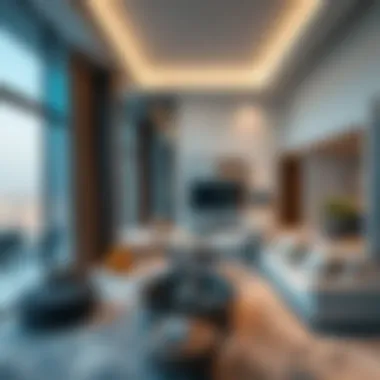Insights on Dubai's Secondary Real Estate Market


Intro
The secondary real estate market in Dubai is a landscape of opportunity and complexity. As this vibrant city continues to draw individuals and families from around the globe, understanding the intricacies of its secondary market becomes paramount for investors and homebuyers alike. In the shadow of the opulent skyscrapers, a bustling community thrives with a dynamic blend of residential options, from luxury villas to cozy apartments. This article takes a closer look at the trends, strategies, and essential insights that govern this multifaceted market.
Market Analysis
Current Trends in Property Prices
The price movements in the secondary real estate market tell a compelling story. After a phase characterized by volatility, property prices have stabilized, reflecting a cautious optimism among buyers and investors. Recent reports indicate that average property prices in neighborhoods like Downtown Dubai and Dubai Marina have seen fluctuations, often influenced by various factors such as economic trends and changing buyer preferences. It’s not uncommon to find properties that appreciated significantly over the past few years yet still offer competitive entry points for newcomers.
Factors such as proximity to amenities, value for money, and community appeal significantly impact pricing trends. As investors become more discerning, the demand for high-quality developments, such as those in Jumeirah Village Circle, remains robust.
“In a rapidly changing market, understanding the nuances of property prices is key to smart investments.”
Future Growth Projections
Looking towards the horizon, the secondary market in Dubai is poised for growth. Analysts project a consistent increase in property values over the next few years as the city continues to develop its infrastructure and attract international events. Similarly, demographic changes—more expatriates seeking long-term residency—will sustain demand for secondary properties.
Investors should note developments in areas planned for future growth, such as the Dubai Creek Harbour or Dubai South. These districts, integrating residential, commercial, and recreational facilities, promise to transform the property landscape further.
Buying and Selling Tips
Essential Steps for First-Time Buyers
Navigating the secondary market can feel like walking through a maze, especially for first-time buyers. To simplify the process, consider these steps:
- Research Neighborhoods: Each area in Dubai carries its character, amenities, and demographics. Take time to explore different neighborhoods to find one that aligns with your lifestyle and investment goals.
- Engage a Real Estate Agent: A good agent can provide insights into market trends, property values, and help you navigate legalities. This relationship can make the process smoother and less overwhelming.
- Secure Financing: Before making an offer, ensure you have your financing sorted. Whether opting for a mortgage or cash transaction, having your budget laid out will avoid future headaches.
- Conduct Due Diligence: Inspect the property. That means not only looking at the aesthetic aspects but also understanding any potential issues like maintenance costs or lease rules.
Strategies for Selling Properties Effectively
For current homeowners looking to sell, an informed strategy can make a substantial difference in achieving the desired sale price. Here are some effective tactics to consider:
- Pricing Strategically: Price your property competitively based on comprehensive market analysis. Overpricing can deter potential buyers.
- Stage Your Home: First impressions count. Consider minor renovations or staging to enhance appeal. A well-presented home can lead to quicker sales at better prices.
- Utilize Online Platforms: Leverage social media and real estate websites to gain visibility. Platforms like Facebook Marketplace and Property Finder can expose your listing to a broader audience.
- Market the Unique Features: Highlight what makes your property stand out, whether it’s a breathtaking view or energy-efficient appliances.
For additional insights, check out resources like Wikipedia or Dubai Land Department for real estate regulations and guidelines.
Understanding the Secondary Real Estate Market
The secondary real estate market in Dubai plays a crucial role in determining not only how properties are bought and sold but also how the overall economy in the region adapts to various factors. By diving into this intricate segment of the market, investors, homebuyers, developers, and real estate agents can better navigate the dynamics that govern property transactions. In this exploration, we will uncover the significance of the secondary market—its), hidden opportunities, challenges, and the strategies that can be employed to make informed decisions.
Definition of the Secondary Market
The secondary real estate market refers to the reselling of previously owned properties. Unlike the primary market, where new builds are sold directly from developers, the secondary market deals primarily with transactions between individuals. It encompasses a wide variety of property types, from apartments to villas and commercial spaces.
In essence, when someone purchases a property that has had a previous owner, they are engaging in the secondary market. This market allows for a diverse range of transactions, from those who want to live in a ready-made home to investors looking to add to their portfolios by buying properties that have already appreciated in value.
Distinction Between Primary and Secondary Markets
Understanding the difference between the primary and secondary markets can be likened to distinguishing between an artist’s original artwork and a reproductions. While the primary market is akin to buying a first edition, the secondary market offers potentially more value through established neighborhoods and completed homes.
- Primary Market:
- Secondary Market:
- Involves new constructions.
- Usually involves higher prices due to newly built properties and amenities.
- Buyers typically make purchases directly from developers.
- Primarily consists of resale properties.
- Prices vary significantly depending on the condition, location, and demand of the property.
- Offers greater flexibility for buyers looking to negotiate.
In Dubai, the interplay between these two markets is vital. The primary market feeds the secondary market, as new constructions come onto the market, often pushing prices up for older properties due to competition for desirable locations. This relationship is also what attracts investors. The potential to capitalize on property’s appreciating value is often more tangible in the secondary market, with buyers able to see previous sales history and neighborhoods that are maturing.
Understanding these foundational definitions and distinctions paints a clearer picture of how the secondary real estate market operates within Dubai's broader economic landscape.
Current Trends in Dubai's Secondary Market
The secondary real estate market in Dubai is currently experiencing a fascinating evolution that can not only inform future investments but also dictate the pace of market activity. Understanding these trends is crucial for real estate agents, investors, homebuyers, and developers alike, as it paints a picture of where opportunities might lie and what challenges could arise. It’s no secret that Dubai's real estate landscape is as dynamic as the region itself, with an ongoing interplay of various factors shaping the market.
Price Fluctuations and Market Demand
Price movements in Dubai's secondary market tend to be a reflection of broader economic conditions, supply chain issues, and geopolitical events. Lately, there's been a noticeable increase in property values in sought-after neighborhoods like Dubai Marina and Downtown Dubai. This recent uptick, driven by renewed buyer interest and robust demand, showcases that well-located properties are bouncing back after the pandemic-related slump. However, not all segments of the market are experiencing the same level of enthusiasm.
In many areas, especially those that are less developed or further from established hubs, prices are stagnant or even dropping. New developments have flooded certain locales, making it vital for buyers and sellers to keep an eye on inventory levels.


Investors should consider the following:
- Evaluate price trends not only within specific areas but also the type of properties being sold.
- Monitor seasonal fluctuations, which historically influence buyer behavior.
- Stay updated on government announcements, as incentives or restrictions can significantly tilt market dynamics.
"Navigating the twists and turns of price fluctuations requires a keen sense of timing and local market insight."
Buyer Preferences: Residential vs. Commercial
In the current secondary market, buyer preferences are an interesting study. It appears that residential properties are generating more buzz than commercial spaces. With the rise of hybrid work models and a shift in consumer behavior, potential buyers now tend to show more interest in residential properties. They are looking for not only homes but also work-friendly environments that cater to their new lifestyle.
The demand for commercial space, on the other hand, has taken a hit. Concerns surrounding remote working trends have left many potential investors hesitant. For those looking to dive into the commercial market, understanding tenant needs becomes paramount, as flexibility and adaptability to new requirements have a significant role to play. Buyers should note:
- Recent surveys suggest a growing interest in technology-enabled homes, further driving up residential prices.
- Investors are leaning towards properties that offer additional workspace within a residential setup.
Impact of Economic Factors on the Market
Economic factors cannot be overlooked when discussing the secondary market. Dubai's economy has shown resilience, but external conditions, such as oil prices fluctuations and global financial markets, play a critical role in shaping buyer confidence.
In the aftermath of global events, the banking sector has tightened financing options, which can directly hit market activity. As people feel the economic pinch, some potential buyers might hold off on purchases, while others may seek out more affordable options. For investors, it becomes essential to assess:
- The correlation between economic indicators and property demand.
- How interest rates are affecting purchasing decisions.
- Potential dependency on foreign investments, which has implications during times of geopolitical tension.
In sum, the secondary market in Dubai is a living creature, adapting to shifting circumstances and desires of its players. By keeping an eye on price trends, understanding buyer preferences, and navigating economic influences effectively, stakeholders are better positioned to make informed decisions. It's through a careful observation of these trends that one can hope to achieve a successful interaction with Dubai's property market.
Key Factors Influencing the Secondary Market
Understanding the key elements that shape the secondary real estate market in Dubai is crucial for anyone involved in buying or selling properties. These factors are not just a blend of statistics and trends; they encapsulate the pulse of the market. A keen grasp of these aspects aids investors, homebuyers, developers, and agents in dissecting the landscape more critically, recognizing lucrative opportunities, and avoiding pitfalls. Each element we've chosen to highlight plays a significant role, weaving together the fabric of the market dynamics.
Government Policies and Regulations
When it comes to real estate, government polices can either make or break the industry. In Dubai, regulatory frameworks are designed to encourage foreign investment and spur growth in the housing sector, but they also come with strict guidelines to protect buyers and sellers alike.
For instance, various initiatives have been introduced, such as the introduction of long-term visas for property investors. This policy not only enhances the appeal of Dubai as a residential choice for many foreign nationals but also fosters an environment where trust and security are fostered between the government and potential buyers. Additionally, shifts in laws, like the recent requirements for property registration and the dynamics of lease agreements, can affect property values and buyer confidence.
Quote: "Government stability and clear legal frameworks instill confidence amongst investors, making real estate a preferred asset class."
Overall, keeping an eye on policy changes is essential for stakeholders who wish to keep their investments sound and understand future market directions.
International Investment Trends
Dubai's real estate market has always been an attractive beacon for international investors. The trends often pivot on global economic shifts, geopolitical stability, and investment climates found in various countries. A growing number of international players, especially from Europe, Asia, and the Middle East, are showing interest in Dubai's real estate. This influx can dramatically push up demand, leading to price escalations in desirable areas.
Factors like currency fluctuations and trade dynamics also influence where investors choose to put their money. Comprehending these international investment trends is like reading a crystal ball for future capital movements in Dubai.
Furthermore, the emergence of new markets, such as those in the Far East, contributes to competition but also diversifies investment portfolios for local and international entities seeking to capitalize on Dubai's unique appeal.
Infrastructure Developments and Urbanization
The role of infrastructure in shaping the secondary market cannot be overstated. Infrastructure developments, from transportation networks to community facilities, can significantly enhance property values. For instance, the expansion of the metro rail system and new road networks integrates previously unconnected areas, thereby attracting buyers and investors looking for future gains.
Urbanization trends in Dubai also contribute to the real estate market's evolution. With more people flocking to urban centers for work and lifestyle, demand for residential and commercial properties continues to surge. Moreover, with ongoing projects like Dubai Creek Harbour and the Expo 2020 site, it's evident that urbanization is a driving force making the secondary market not just viable, but vibrant.
In summary, grappling with these key factors influencing the secondary market gives investors a robust tool to navigate the complexities of Dubai's ever-changing real estate landscape. With each element interconnected, understanding their overlap allows for more strategic and informed decision-making.
Buying in the Secondary Market
When diving into the real estate landscape, buying in the secondary market can be a golden ticket for many. It's not just a straight deal; the secondary market offers unique opportunities that can make or break an investment. As we traverse this intricate maze, it’s essential to grasp the nuances that define this aspect of Dubai's real estate scene.
The secondary market allows buyers a chance to acquire properties that have been previously inhabited or owned. This means potential deals that can often skip past the usual development delays associated with new constructions. Moreover, these properties often come with established neighborhoods, infrastructure, and sometimes, even matured landscaping, making them quite attractive for those looking to settle down quickly or invest wisely.
Assessing Property Value
Determining property value in the secondary market requires a keen eye and a pinch of due diligence. Buyers must consider numerous factors:
- Location: The saying goes, "location, location, location." Properties in prime areas tend to retain or appreciate in value better than those on the outskirts. Look at accessibility to amenities like schools, hospitals, and transport links.
- Property Condition: A meticulous inspection is crucial. Buyers should look for any repairs needed, updates, or even renovations that could either add value or require substantial investment. This might involve hiring a professional to take a closer look at the structural integrity and overall condition.
- Market Comparables: It’s wise to analyze similar properties in the area. What are they selling for? What amenities do they have? This can pinpoint whether a property is priced fairly or if it leads to more negotiation room.
Negotiation Strategies
Negotiating in the secondary market can feel like a high-stakes game. However, with the right strategies, buyers can secure favorable deals. Here are some effective tactics:
- Knowledge is Power: Equipped with knowledge about comparable properties, recent sales, and market trends, buyers can go into negotiations feeling confident.
- Diamond in the Rough: Spotting properties that may need minor repairs can position buyers as those willing to invest a little extra for a significant gain later. Sellers might be more open to negotiations if they know it’s a fixer-upper.
- Be Personal, Yet Professional: Establishing a rapport with the seller can work wonders. Sometimes, a personal touch can make the difference, especially when multiple offers are on the table.


Financing Options for Buyers
Navigating through financing options is another critical step when buying in the secondary market. Buyers should explore:
- Mortgage Options: Traditional banks and financial institutions offer various mortgage plans. Understanding the terms and conditions can guide buyers toward the most budget-friendly choice. Buyers may also benefit from lower interest rates when choosing properties that are not brand new.
- Cash Purchases: If feasible, paying in cash can often lead to stronger negotiating power. Sellers may prefer cash offers due to the speed and reduced uncertainty, enabling buyers to possibly negotiate a lower price.
- Local Financial Institutions: Sometimes, local banks and credit unions can provide more competitive offers or tailored advice for foreigners looking to buy in Dubai. It’s worth reaching out to them to explore potential benefits.
In summary, buying in the secondary market not only presents a plethora of opportunities but also demands meticulous evaluation and strategy. By understanding property values, honing negotiation skills, and exploring diverse financing options, buyers can position themselves favorably in this bustling market. Remember, knowledge and preparedness are your steadfast companions in this journey.
Selling in the Secondary Market
Navigating the secondary real estate market can prove to be a pivotal moment for property sellers, especially in a dynamic landscape like Dubai. Selling in this market goes beyond simply putting a sign in the yard and hoping for the best. It involves an intricate process that can significantly boost a seller’s return on investment if executed wisely. Thus, understanding how to sell effectively in the secondary market is crucial, both for achieving satisfactory outcomes and for fully leveraging the opportunities present in a competitive environment.
Preparing a Property for Sale
When gearing up to sell a property, first impressions matter—a lot. Preparing a property for sale involves both logistical considerations and aesthetic enhancements. To make your space stand out, sellers should consider minor renovations or touch-ups. A fresh coat of paint can do wonders, and sprucing up the landscaping can create a positive first impression.
Additionally, it's advisable to declutter and depersonalize the space so that potential buyers can envision themselves living there. According to real estate experts, homes that appear clean and well-maintained tend to sell faster and often at higher prices. What’s more, hiring a professional for staging can bring a fresh perspective, turning an ordinary home into a desirable one.
Marketing Strategies for Sellers
Marketing isn't just about listing the property; it's an art form in itself. A well-rounded marketing strategy leverages multiple platforms to reach a diverse audience. Effective online marketing is crucial; utilizing social media platforms like Facebook for targeted ads can significantly expand your reach. Furthermore, consider creating virtual tours or high-quality videos that give potential buyers a genuine feel of the space.
Traditional methods still hold merit too. Open houses in well-trafficked areas can attract interested parties. Additionally, collaborating with local real estate agents can further enhance visibility. These agents often have a robust network, increasing exposure to qualified buyers.
Understanding Market Timing
Timing can be the linchpin of a successful sale. Understanding when to put your property on the market can directly affect the sale price and how quickly your property moves. For instance, the spring and early summer months often see increased buyer activity, making it an optimal time for listing.
Furthermore, keeping an eye on global events and local economic indicators can also guide your decision. Economic stability usually leads to heightened buyer confidence and willingness to invest. On the flip side, a downturn might signal a need for strategic patience. Being attuned to these trends and adjusting your strategy accordingly can allow sellers to maximize their opportunities in a fluctuating market.
"Optimal market timing, alongside effective marketing, can transform the selling experience from arduous to rewarding."
In summary, selling in the secondary market in Dubai encompasses various layers from preparing the property to adopting a clever marketing strategy while keeping an eye on the market pulse. Sellers who invest time and effort into these areas can potentially reap substantial rewards.
Legal Considerations in the Secondary Market
Understanding the legal landscape in Dubai's secondary real estate market is vital for all participants—from buyers to investors to agents. Legal considerations play a significant role in ensuring that transactions are transparent, valid, and secure. As the saying goes, "knowledge is power," and this rings especially true in real estate where the stakes can be high.
An informed participant is better equipped to navigate complexities like title deeds, property rights, agent responsibilities, and dispute resolution. With the rise of international investment in Dubai, familiarizing oneself with the legal regulations is non-negotiable.
Title Deeds and Property Rights
Title deeds are the backbone of real estate ownership in Dubai. A title deed is more than just a piece of paper; it formally indicates who owns what. This document holds legal weight and must be registered with the Dubai Land Department.
- Types of Ownership: There are generally two types of ownership in Dubai—freehold and leasehold. Freehold gives the owner full rights to the property, while leasehold allows ownership for a specified period, often up to 99 years. Understanding these distinctions helps clarify your rights and responsibilities.
- Verification: Before any sale goes through, it is crucial to verify that the title deed is genuine and free of any encumbrances. Conducting due diligence can save one from future legal squabbles. Engaging a legal expert can be beneficial here, as they can confirm the validity of the title and ensure that there are no hidden claims.
In a market as dynamic as Dubai, knowing your property rights isn't just smart; it's essential.
Role of Real Estate Agents
Real estate agents are not just facilitators; they serve as a crucial intermediary within the real estate ecosystem. Their role extends beyond showing properties—agents assist with the legal intricacies involved in transactions.
- Guidance: A reputable agent provides guidance on market conditions, documents required, and the legal ramifications of property transactions. Their expertise can help you navigate the murky waters of legal requirements that can sometimes be overwhelming for non-professionals.
- Contracts and Documentation: Agents are often responsible for drafting and reviewing contracts, which is an important aspect of any real estate transaction. They ensure that every clause protects your interests and adheres to the laws of Dubai. Not taking this step can lead to contracts that may be legally questionable.
- Negotiate: A well-informed agent can negotiate terms that align with your needs while ensuring compliance with the law. Their experience can provide leverage, especially when it comes to pricing and contingencies.
In essence, choosing the right real estate agent can make or break your transaction.
Dispute Resolution Mechanisms
Disputes in the secondary market can arise from a variety of factors, including misinterpretation of contracts, encumbrances on the property, or even disagreements between parties. Knowing how to effectively resolve these disputes can save you time, money, and stress.
- Practical Steps: If a disagreement occurs, the first step often involves mediation. The goal here is to reach an informal agreement without escalating the matter further. In Dubai, mediation services are readily available and can preserve relationships that might otherwise be harmed by litigation.
- Legal Channels: If mediation fails, you may need to consider formal legal action. The courts in Dubai have specific provisions for real estate disputes, and having legal counsel is advisable to guide you through the process.
- Alternative Dispute Resolution (ADR): Dubai has shown a growing preference for ADR methods, such as arbitration. This can provide a more rapid resolution than traditional court processes. It is less formal, often more private, and can be tailored to suit the specific needs of the parties involved.
"Knowing the right steps for dispute resolution can save you the headache and the heartache."
In summary, diving deep into the legal considerations of buying or selling property in Dubai's secondary market is crucial. This includes grasping the importance of title deeds, recognizing the role of real estate agents, and understanding the methods available to resolve disputes. Ignoring these aspects can lead to costly mistakes, while being informed enhances the chances of a smooth transaction.
For those interested in a deeper look into Dubai's legal framework, consider exploring resources on the Dubai Land Department and legal forums on platforms like Reddit. This knowledge can prove invaluable as you navigate your real estate journey in this vibrant city.
Challenges in the Secondary Market
The secondary real estate market in Dubai, while bustling and vibrant, presents a series of complexities that both buyers and sellers should deeply consider. These challenges can significantly impact investment decisions and overall market health, effectively setting the stage for success or, conversely, pitfalls. Understanding these challenges is not just beneficial; it’s essential for anyone looking to navigate this intricate landscape.


Market Saturation Risks
Dubai's rapid growth and development have led to a booming real estate environment, but this can also mean the market is close to saturation. When numerous similar properties flood the market, competition can become fierce, leading to downward pressure on prices. Saturation can make it difficult for sellers to attract buyers, thus elongating the sales process.
A localized example can be observed in popular areas like Dubai Marina, where an influx of luxury apartments has created a scenario where buyers are spoiled for choice. While this has advantages for buyers, it poses risks for current owners of similar units. If sellers aren't proactive in differentiating their properties—perhaps through renovations, unique marketing strategies, or strategic pricing—they may find themselves struggling to sell. This scenario represents just one of the brick walls that someone looking to sell a property in Dubai may hit.
Investors should also consider the long-term effects of saturation. A property that is widely available might see reduced rental yields. Keeping tabs on market indicators, and staying flexible in strategy can be crucial in overcoming this challenge.
Economic Instability and Its Effects
Economic factors invariably weave into the fabric of the secondary real estate market. Fluctuations in oil prices, changes in global financial trends, and regional geopolitical tensions all play a role in this vibrant market. Economic stability—or its absence—can directly affect buyer confidence, as potential homeowners and investors need to feel secure in their financial commitments.
For instance, during periods of economic downturn, many would-be buyers may hold back on making purchases, resulting in fewer transactions. This reduced activity can lead to a slowdown in price appreciation, affecting both current homeowners and potential investors. The economic climate can also shift buyer preferences from luxury living to more affordable housing options, altering the market dynamics.
Key takeaway: It’s vital for investors and homebuyers to closely monitor economic indicators, whether that’s employment rates, inflation stats, or shifts in consumer confidence. Making well-informed decisions amidst economic fluctuations can distinguish savvy investors from mere opportunists.
Changes in Investor Sentiment
Investor sentiment can dramatically influence the secondary market in Dubai. As trends in the global economy evolve, so too do the attitudes and appetites of investors. Factors such as news about potential legal changes, updates on property regulations, or shifts in international investment policies can affect how investors perceive the market's viability.
When sentiment is positive, it often leads to increased interest and investment, driving prices upward. Conversely, when the sentiment takes a nosedive, potential buyers may retreat, leading to stagnation in the market.
For example, during times when property regulations favor foreign investment, there can be a surge in sales. However, if stricter regulations are imposed, potential investors may be deterred by perceived risks, which could lead to a drop in property values.
It’s important for participants in the market to cultivate a pulse on investor sentiment. Keeping an ear to the ground through networking, attending industry events, or participating in online forums can yield valuable insights into potential shifts before they happen.
Ultimately, the challenges within the secondary market should not be viewed as dead ends but as avenues for strategic thinking. By adapting to market conditions, understanding the economic landscape, and responding to shifts in investor sentiment, stakeholders can navigate these tumultuous waters with a more resilient approach.
Future Outlook for the Secondary Market
The secondary real estate market in Dubai stands on the brink of substantial evolution. Understanding what lies ahead is crucial for everyone involved, from seasoned investors to first-time homebuyers. The future outlook provides insights not just on potential growth but also on the strategic steps necessary for success in this vibrant market.
As we dig into this aspect, it's important to consider several factors that impact the real estate landscape. The Dubai market is dynamic, constantly reshaped by economic variables, innovation, and shifting consumer preferences. Ensuring that stakeholders grasp the complexities of these changes is key for making informed decisions about their investments.
Projected Growth and Development
When speaking of growth, many eyes are focused on the long-term development prospects of Dubai's secondary market. Recent projects planned in emerging areas, such as Dubai Creek Harbor and Dubai South, indicate a push for diversification that could attract new buyers. Economic forecasts suggest a steady uptick in property values, largely due to increasing international interest and a growing population.
The Dubai property market has not just recovered from recent economic downturns but has the propensity to thrive. Reports from local real estate authorities highlight ongoing support in various forms, such as favorable regulations and infrastructure enhancements that stimulate market confidence. However, it’s wise to note possible phases where growth may plateau.
Emerging Opportunities for Investors
As opportunities arise, investors should keep their antennas up for unique propositions. Notably, the demand for eco-friendly and smart homes is on the rise. The trend isn't just a passing fancy but reflects broader global movements towards sustainability. Those who invest in such properties are not only tapping into a niche market but also contributing to the environmental efforts that resonate with today’s buyers.
Furthermore, the secondary market presents an avenue for diversification, especially for foreign investors looking to establish a foothold in the UAE. With various projects being sold at competitive prices, one can acquire considerable value by recognizing the hidden gems in less frequented locales. Understanding these subtleties could very well separate the seasoned investor from the novice.
Impact of Technology on Market Transactions
Lastly, as we look ahead, technology continues to embed itself deeper into the transaction processes. The incorporation of digital platforms facilitates not only quicker sales but also enables more data-driven decision-making. Technology such as virtual tours and AI-driven property evaluations are easing the burdens associated with traditional real estate transactions. This not only optimizes the buyer's experience but also provides sellers a broader reach.
Furthermore, blockchain technology has begun to make waves in property transactions, potentially revolutionizing title transfers and enhancing security. The ongoing integration of such technologies signifies that those who embrace these changes will likely have a competitive edge in the market.
Investing in knowledge paves the way for profitable transactions in an ever-evolving market.
In summary, the future outlook for Dubai’s secondary real estate market appears promising. By understanding the projected growth areas, harnessing emerging opportunities, and leveraging technology, stakeholders can position themselves favorably. As the landscape transforms, those who grasp these elements will navigate the market with greater ease and confidence.
Culmination and Strategic Recommendations
As we wrap up our exploration of Dubai's secondary real estate market, it becomes clear that understanding this sector is not just beneficial but essential for those deeply invested in property—be it buyers, sellers, or investors. The conclusion drawn from our analysis underscores the dynamic nature of the market and the myriad opportunities it presents, while also emphasizing a thoughtful approach to transactions.
Evaluating Investment Strategies
Investment in real estate, especially in a region as vibrant as Dubai, requires astute evaluation of various strategies. When considering the secondary market, one needs to gauge factors such as market trends, location, and potential for capital appreciation.
A few strategic approaches can include:
- Market Research: Diligent market research is paramount. Thoroughly analyze historical price trends and demographic shifts. For instance, observing consumer appetite in neighborhoods like Dubai Marina can reveal emerging opportunities.
- Network Utilization: Leverage connections with real estate agents and market analysts. True insights often lie within shared experiences and local knowledge.
- Diversification: Balance your investment portfolio by including a mix of residential and commercial properties. This not only spreads risk but also capitalizes on diverse revenue streams.
"The best investment you can make is in yourself. The more you learn, the more you earn." - Warren Buffett
Building Long-term Value in Real Estate
Establishing long-term value in properties requires foresight and a proactive mindset. It’s not just about the immediate returns; it’s about creating a legacy. To ensure sustainable growth:
- Maintenance and Upgrades: Regular upkeep and future-proofing through renovations can significantly enhance property value. Invest in energy-efficient technologies, which have started attracting buyers who value sustainability.
- Community Engagement: Be part of the local community. Supporting neighborhood initiatives fosters goodwill, which can enhance property value over time.
- Economic Awareness: Stay updated on economic indicators that impact real estate. For example, shifts in tourism trends can directly affect the desirability of investment locations within Dubai.
Ultimately, navigating the secondary market effectively means you must remain adaptable and informed. The journey doesn't end with a purchase or sale; it's a continuous endeavor to seek out value, maintain properties, and respond to market shifts. Building lasting relationships within the industry can also solidify your standing within this intricate ecosystem.















